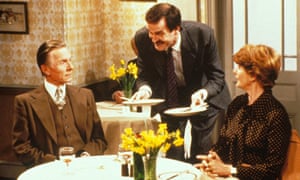

In a crumbling edifice, a farce plays out. The hapless central character fawns on an aristocrat who turns out to be a conman. He then fails to disguise his unease when confronted with his European neighbours, doesn’t bother to mask a thorough contempt for the Irish, and enters a love-hate relationship with ostentatiously wealthy Americans. Meanwhile, there are questions over food safety and supply (specifically kippers, duck and veal cutlets) as workers scurry around trying to pretend that nothing out of the ordinary is happening. Always disaster hovers at the edge of vision.
Forty years after the finale of Fawlty Towers, which has just been named the UK’s best ever situation comedy, its eerie prescience seems even more important than the cringing laughter it gifted us. For Fawlty Towers was, above all, an ensemble piece about isolation. It was a portrait of rage and frustration, an exploration of the impotence that results when the world as we wish it to be is so agonisingly at odds with the world as it is. It was the Brexit mindset incubating in the shabby surroundings of a down-at-heel hotel that had seen far better days.
What is Basil Fawlty, beyond the proprietor of this shonky hotel? Well, he is a snob, for starters: in the first ever episode, A Touch of Class, he abruptly reverses his customary hostility on learning that a prospective guest is a lord, clearly hoping that a visiting toff will magically improve the hotel’s social standing (one of his first conversational gambits is to rave to Lord Melbury about the properties of fields of wheat, which may perhaps have stuck somewhere in Theresa May’s psyche).
A man of somewhat mysterious origins, Basil Fawlty is acutely class conscious, at once mistrustful of the working classes and a Labour party that he sees as encouraging their propensity for industrial action, and anxious about his own lack of social status. Professionals – experts, one might say – frighten him; rules and regulations intimidate him; the need to ingratiate himself to foreigners infuriates him.
The put-upon Spanish waiter, Manuel, is, for Basil, there to receive a last kick – usually up the backside – from imperial Britain. He is another outsider to be pushed, prodded, poked and communicated with through a loudhailer. But the British empire to which Basil wants to return is already a thing of the past; the world more complicated than his blinkered mind can admit. Watch Fawlty’s visceral horror as young people flaunt their sexuality, as the common people dare to holiday in sedate Torquay, and – in a moment that causes Fawlty to literally jump in disbelief – the NHS is staffed by doctors who are black.
Basil’s most celebrated meltdown comes, of course, when he is confronted with a touring group of well-to-do, articulate, friendly Germans. His psyche splits: he knows he must be welcoming, but cannot find the mental space or language that allows him to forget the second world war. The MP Mark Francois and his squadron of nostalgia-basted, 1945-obsessed calamity-capitalism spivs are mere tribute acts to Fawlty. If only we had picked up that Basil – far from being a glimpse into the past – was a snapshot of the future, we might have been able to do something about it.
Yes, not for nothing was Fawlty’s wife called Sybil. Fawlty Towers now appears to have something of the downright prophetic about it. But let’s try to extract a moment of hope for these bleak times. In the end, whether clonked by a moose’s head, thrashing a recalcitrant car with a branch, derailed by a drunken Greek chef or outwitted by a wily Irish builder, Basil doesn’t get his way. His peculiar aspirations are curtailed and forced to conform to the realities of a complex, nuanced world.
At moments, we all wish to retreat to an imaginary place: a womb with a view, if you will. We all become flooded with fury, suspicious of others and certain that we’re being denied the wealth, power and sex that they have. But beyond the hardboard walls of a sitcom set lies reality. Time for us to leave Basil behind and face it.
The Guardian










Leave a comment